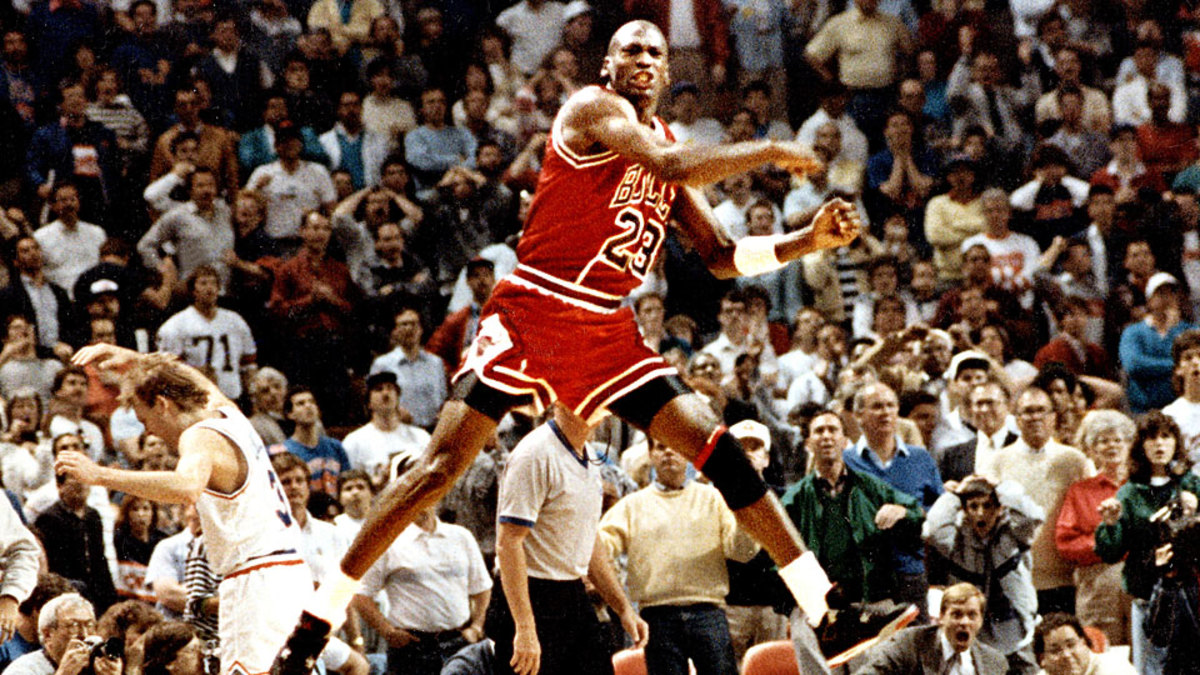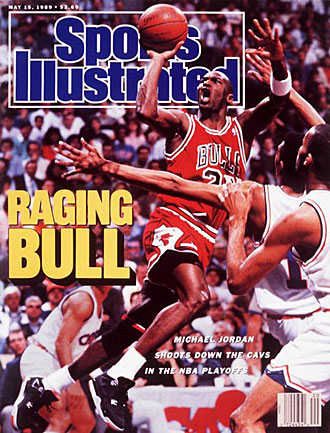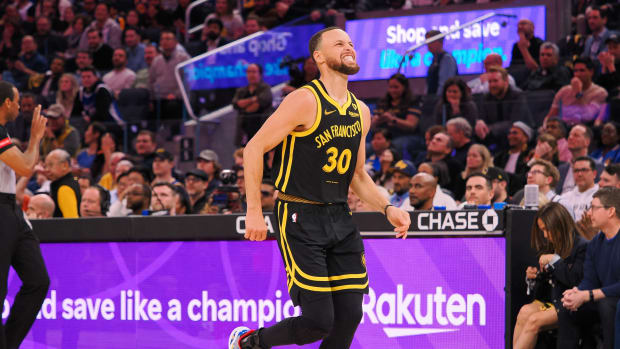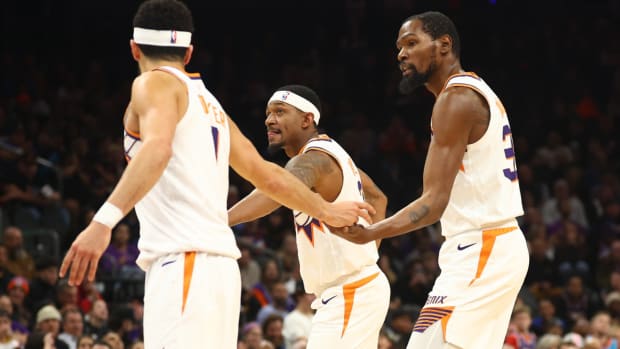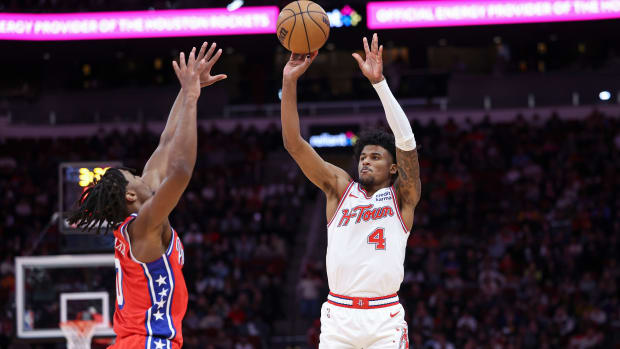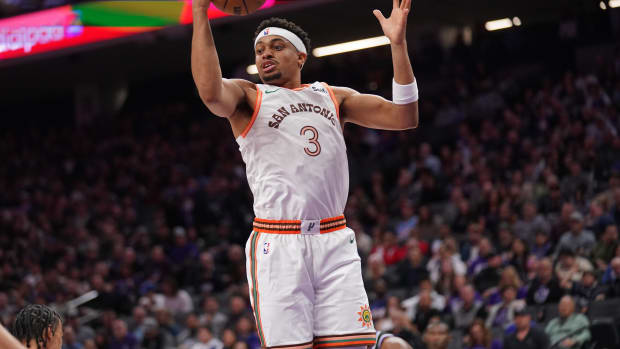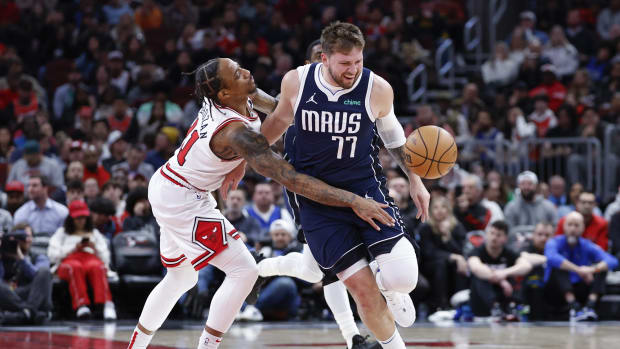SI Vault: 'Un-fath-om-able': The day Michael Jordan hit The Shot
This story originally appeared in the May 15, 1989 issue of SPORTS ILLUSTRATED.
Perhaps the teenager sensed that something big was going to happen later that day. At any rate, moments after Michael Jordan finished his late breakfast on Sunday at a suburban Cleveland hotel, the young man dashed over to claim, of all things, Jordan's fork. ''Look!'' he shouted. ''Michael Jordan's fork!'' The kid waved it at his friends. They stared at the fork, an icon of sorts. ''Michael Jordan ate with this fork,'' said the young man. The teenager then looked around furtively, and said, ''I'm taking it.'' With that, he picked up the fork, stuck it in his pocket and walked out of the restaurant.
Had the utensil turned up at a Richfield Coliseum souvenir stand some seven $ hours later, even a Cleveland Cavaliers fan might have paid big bucks for it. The fifth and deciding game of Chicago's Eastern Conference first-round series against the Cavs was Michael Jeffrey Jordan's to win in dramatic fashion, and that is precisely the fashion in which he won it.
With Chicago trailing by one point and the clock showing just three seconds, Jordan caught an inbounds pass that everyone knew was headed his way and took a shot that everyone knew he was going to take. Adding to the degree of difficulty was the flying form of a 6'7" defender, Craig Ehlo, who darkened Jordan's horizon from the right side for a split second. No problem. Jordan simply double-clutched on the 18-foot shot and sent it spinning toward the hoop with perfect rotation. It rattled the back of the rim and went in, his 43rd and 44th points of the game, giving the Bulls a 101-100 victory.
''Un-fath-om-able,'' said Cavs center Brad Daugherty, emphatically. ''Simply unfathomable.'' And this from a man who played with Jordan for two years at North Carolina, where he surely saw many un-fath-om-able things. More amazing still was the fact that Jordan had made another clutch jumper, with six seconds left, a 12-footer over the outstretched hand of 6 ft. 10 in. Larry Nance, which had given the Bulls a momentary 99-98 lead.
''Michael Jordan . . . superstar,'' said Nance, trying to analyze the game later. With a few words, a man of few words said it all. Going into this series, Jordan had the highest playoff scoring average in NBA history (35.9), and his 199 points—he had a record 226 in last season's first-round, five-game victory over Cleveland—raised his average to 36.7. The win sent the Bulls into the second round of the playoffs against New York. The heartbreaking loss, meanwhile, carved another psychic scar into Cleveland's sinking sports self-image. How could the Cavs, a team that tied with the L.A. Lakers for the NBA's second-best record (57-25), lose to a team that had 10 fewer wins, a team they had beaten all six times they met during the season?
55: Remembering the night Michael Jordan announced his return to dominance
The Cavs were a balanced unit, a team of such consistency and emotional stability that their longest losing streak during the season was two games. The Bulls, by contrast, were a volatile, up-and-down bunch, unpredictable, with a tendency, like spectators at a Fourth of July fireworks show, to stand around and watch Jordan's pyrotechnics. The Cavs were nine-deep. The Bulls were sometimes one-deep. What happened?
For one thing, there was the play of Daugherty, which ran the gamut from A (adequate) to B (bad). He averaged 11.0 points a game on .362 shooting from the field, and 9.2 rebounds (compared with his regular-season averages of 18.9 ppg, .538 shooting and 9.2 boards). In the final game, one could sense Daugherty overthinking when he got the ball, reacting instead of acting. His last two shots from close range were duds. Mark Price, the little tugboat that pulls the Cavs along, played a brave series, but the groin injury that kept him out of Game 1 and nearly incapacitated him in Game 3, both Cleveland losses, was too much to overcome in the fourth period on Sunday, when he scored just two of his 23 points. Nance (16 points) was not forceful enough in the half-court offense. He did not demand the ball and take control.
Magic Johnson called the Cavs ''the team of the '90s,'' and they still have one more season to start living up to that billing. But the fact remains that they were beaten. It may have taken an unfathomable shot by a sometimes unfathomable player, yet sometimes it happens that way.
As the series began, the Bulls seemed anything but prepared. They had staggered to the regular-season finish line with nine losses in their last 11 games. The season finale could have been titled Playoff Tuneup from Hell, a 90-84 Chicago Stadium loss to the Cavaliers, who were missing Price, Nance and Daugherty.
Chicago's dangerous shooting guard, Craig Hodges (strained Achilles tendon), power forward Horace Grant (sprained left elbow) and small forward Scottie Pippen (tendinitis, right shoulder) were nursing injuries. Jordan was in one piece, thankfully, but the questions about his move to point guard—for the Bulls' last 24 games, during which they were 13-11—were taking on a testy quality. ''If we don't play any better than this,'' said Jordan, after the season's finale, ''we certainly will get swept.'' Then Jordan decided to leave a wake-up call, loud and clear. The day before the series began, he predicted that the Bulls would win in four. He knew his words would end up on the Cavaliers' bulletin board, but he felt he had to take the chance. Then reserve forward Brad Sellers did his part by suggesting that the Bulls wear black sneakers—as Jordan had done in the NBA All-Star Game—to change their luck. During a bus ride to the hotel before Game 1, coach Doug Collins sprang a surprise, too, when he gave the team a multiple- choice test on the Cavs' offense.
And so, pumped up, black-shod and well prepared, Chicago went out and won Game 1 on April 28 95-88, putting the Cavs' franchise record in opening playoff games at 0-7. Price's absence was certainly a major factor. ''The guys seemed a little tight, a little disorganized,'' Price said afterward, in an understatement. ''Nobody was taking charge and getting us into things.'' It was Jordan who was in charge. With the Bulls holding a commanding third-period lead, he stopped at the press table and said to a couple of Chicago writers who had predicted Cleveland in three, ''Sweep, my butt.''
Price returned for Game 2 (at only about 80%, according to coach Lenny Wilkens) and Cleveland won by 96-88. Ron Harper (31 points, 11 rebounds, 4 assists) outplayed Jordan (30 points, 7 turnovers), who, exercising self- censorship, pronounced his play ''horse spit.'' Stronger words would aptly describe the front-running Cleveland fans who booed the struggling Daugherty (6 points, 2 of 8 from the foul line) loudly and frequently.
SI Vault: Flame Thrower: Cubs phenom Kerry Wood strikes out 20 Astros
Still wearing their black sneakers—by now many of the front-office employees, as well as Collins, were doing the same—the Bulls won Game 3 on May 3 in Chicago, 101-94. Price (1 of 12 from the floor, 0 of 5 from three- point range) simply couldn't get moving, and Jordan could. He finished with 44 points. Cleveland gutted out a 108-105 overtime victory last Friday night in Chicago to even the series at 2-2. Jordan had one of the more bittersweet 50-point nights in NBA history, blowing a free throw with nine seconds left that would have given Chicago a three-point lead. Instead, the miss left the score at 99-97, and Daugherty sent the game into overtime with two free throws. Trailing 107-105 in OT with 12 seconds left, Chicago still could have won the game, but center Bill Cartwright whirled to make an inside move and virtually handed the ball to Daugherty. It lacked only gift wrap to make it an official present.
''I don't blame Bill, I don't blame anybody,'' said Jordan after the game. ''I can't pin it on anybody but me.'' He was disconsolate, and it was no act.
Curiously, the rest of the Bulls, particularly the younger players, took the loss well. It is difficult being Michael Jordan's teammate -- one can never measure up -- and perhaps, subconsciously, it was nice, even somewhat therapeutic, to see the clay on Mighty Michael's feet. In any case, one had the sense that the Bulls were not going to crawl into a hole and die for Game 5. Horace Grant's twin brother, Harvey, who plays for the Washington Bullets, was in the locker room after Game 4 and did a nice job of handling a couple of Horace's interviews. Even Chicago general manager Jerry Krause began a conversation with Harvey, before he saw a few of the other Bulls cracking up in the corner and realized he was being duped.
In Game 5, Jordan contributed just enough (14 points) in the first half to keep the Bulls close, while trying, in traditional point-guard fashion, to spread the wealth. Some of it even went to Cartwright (12 first-half points), with whom Jordan has coexisted uneasily on the court all season. Even in Sunday's game, Jordan at one point snapped at Cartwright, ''Catch the ball!'' after a pass had gone through his hands. But in that game, and in fact, throughout the series, Cartwright, the center of the past, was at least the equal of Daugherty, the center of the future.
Jordan looked for his shot in the second half (he took 19 of his 32 in the final 24 minutes), but he was not a man swimming alone, as he has been much of the season. Grant had played passively in the first half, and just before the start of the third period Collins made sure to show him his first-half rebounding line (1) on the stat sheet. Grant awakened in time to make two key baskets off offensive rebounds in the final quarter and finished with five boards. ''That was Harvey out there in the first half,'' said Grant later, ''and Horace in the second.'' Hodges broke out of a slump to nail two three-pointers in the third period. Cartwright made a key tip-in of a Hodges miss with 2:06 left. And Pippen threw in a clutch three-pointer with 1:13 left to give Chicago a 97-95 lead.
But Ehlo, normally the seventh man in the Cavs' rotation, was hot, which was fortunate for Cleveland, because Price seemed to have run out of gas. Ehlo, who led the Cavs with 24 points, put them back on top with a three-pointer. Then, after Jordan's jumper over Nance gave the Bulls a 99-98 lead, Ehlo made an inbounds pass to Nance, alertly cut past Hodges and took the return pass for a layup, giving Cleveland the 100-99 lead.
The Bulls took a timeout with three seconds left, and Collins picked up his chalkboard. What say, Doug -- maybe run the picket fence for Will Perdue? Yet give Collins this: As a strategist, he must constantly come up with new ways for one man to get the ball. And he does.
As the Bulls broke from their huddle, Jordan whispered to Hodges, ''I'm going to make it.'' Sellers took the ball out of bounds near half-court, but the Cavs elected not to challenge the inbounds pass. Nance fronted Jordan, and Ehlo, his defender of record, was behind him. Jordan first set a back-pick on Cartwright's man, Daugherty—''I felt for a split second that maybe he was just a decoy,'' said Ehlo—but it was only a ploy, and Jordan rushed out to the wing to take the inbounds pass. Nance and Ehlo still stalked him. Then Jordan zagged when the defense zigged, and he caught Sellers's inbounds pass in an open area. Two dribbles brought him to the center of the court, a couple of feet behind the free throw line. Then came the winning shot.
''I never saw it go in,'' said Jordan, ''but I knew right away from the crowd reaction—silence—that it was good.'' Jordan smiled slightly. ''Then I did something maybe I shouldn't have. I really celebrated and shouted, 'It's over!' I really felt justice was served.
''I was crushed after I missed that free throw in Game 4. Then I came here and got booed in the introductions. And the crowd hand-waved me when I was at the foul line. I heard them tell me it was time to set up my tee times for the summer. I felt I had something to prove.''
He didn't have anything to prove, of course, but that is what sets the great ones, like Jordan, apart. His teammates know it, his opponents know it, and a young man with a used breakfast fork knows it too.






























